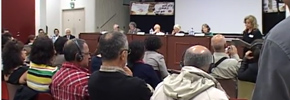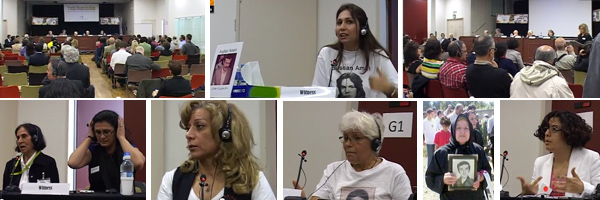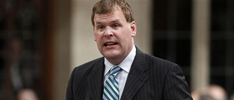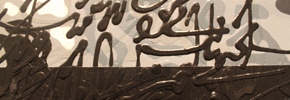Sima Sahar Zerehi – “In one session of the truth commission hearings we heard from the mother of a 15 year old boy who was executed simply because he had a political pamphlet in his pocket. After having her son executed, the mother was asked to pay for the bullets they used to kill him. As she was telling her story and sobbing, the whole room was sobbing with her, and it didn’t matter what political party or ideology was involved because a human life is a human life and the abuse of a 15 year old speaks for itself. There was a moment of transcendence of humanity where people could simply view the pain of a mother who had lost her son, the rest really didn’t really matter,” recounts Dr. Payam Akhavan, one of the eight members of the Iran Tribunal’s International Legal Steering Committee.
Dr. Akhavan is a professor of International Law at McGill University and the co-founder of the Iran Human Rights Documentation Centre in New Haven, Connecticut, an organization devoted to documenting human rights violations in Iran. Akhavan was also the first legal advisor to the Prosecutor’s Office of the International Criminal Tribunals for the former Yugoslavia at The Hague (1994–۲۰۰۰), has served with the United Nations in Cambodia, Guatemala, East Timor, and Rwanda, and represented sovereigns before international courts and tribunals.
The session that he references is part of the Iran Tribunal – a people’s court created to expose the human rights violations that took place during the 1980s in Iran’s prisons. During what has been dubbed the bloody decade, over 20,000 political prisoners, including numerous under-aged detainees were sentenced to death by execution in Iran. The summer of 1988 is remembered by Iranians as one of the darkest stages in Iran’s recent history when over 5000 political prisoners were executed in rapid succession.
Speaking of his involvement in the Iran Tribunal project he modestly states, “I’ve been appointed as the prosecutor of the Tribunal and will be leading the case at the October hearing in The Hague. I suppose the organizers are drawing on my experience as a previous UN prosecutor involved in the prosecution of Yugoslav president Milosevic and others like him.”
The Iran Tribunal is intended to include two stages: A ‘Truth Commission’ and the ‘Tribunal’.
The Truth Commission held sessions in London at Amnesty International’s Human Rights Action Centre last week from June 18 to 22.
The aim of the Truth Commission was to collect statements, witness documents, dossiers and to produce a report on extensive executions in the early years of 1980s as well as mass execution of political prisoners in 1988.
The commission creates a space for victims, relatives of victims, journalists, experts and perpetrators to offer testimony in relation to these human rights abuses and how they have been personally impacted.
The Tribunal will follow the commission in late October 2012 in the Hague.
This will be the second people’s court, in the past century, the other one being the Russell Tribunal, held in relation to the crimes of the United States in Vietnam. Much like the Truth Commission, the Tribunal will also provide a venue for impacted individuals to offer testimony and share their stories. In addition, the Tribunal will be prosecuting the Islamic government of Iran by investigating the findings of the Truth Commission as well as other uncovered data in relation to the executions, torture and human rights abuses in the 80s.
In response to the criticism that a people’s tribunal has no official legal status, Akhavan points out, “This is a people’s tribunal so people might dismiss it easily and say who cares, it has no formal power, but I think it has a lot more power than we imagine because it speaks to tens of thousands of victims of execution and torture and all sorts of other abuses and, it represents virtually the wishes of millions of Iranians for some form of accountability. I think it’s actually much more powerful than the Iranian courts that have no legitimacy whatsoever because after more than twenty years nobody has been held responsible for these mass executions which is the darkest chapter in the history of contemporary Iran.”
Speaking about the significance of the Iran Tribunal, Akhavan states, “I think this is a very historic moment for the Iranian people because we’re learning to engage in a dialogue, we’re learning to speak in terms of principles and that principle is the sanctity of human life, is respect for human dignity which is what we need in Iran to create a culture of human rights.”
He adds, “What is very important and inspiring about this tribunal is that it’s entirely the initiative of the families of the victims and survivors of the mass execution of the 1980s.”
“They decided four years ago that this wound would simply not heal and that after all these years they must gather together, despite all their political differences, and they must unite in a common cause to demand accountability for what they have suffered and engage in a process of truth-telling so that Iranian people know exactly what happened during the first ten years of the revolution in which an estimated 20,000 -25,000 people were executed, merely because of their political or religious beliefs,” explains Akhavan.
Speaking of the victims of these human rights abuses, Akhavan notes, “Some of these people were Mojahedin-e-Khalgh, others were Fadayan-e-Khalgh, others were Tudeh, others were simply human rights activists, others were Kurdish activists, others were not activists at all but were arrested for no reason at all because the Islamic Republic in the 1980s saw it fit in a kind of Stalinist fashion to torture and execute people at random to create a culture of fear and terror.”
When asked why he thinks this initiative came about at this time almost 30 years after the mass executions, Akhavan states: “I think it was a kind of maturation of the Iranian community where people are now learning to speak the language of human rights and they’re learning to engage in dialogue with each other, a dialogue that transcends the very divisive partisanship that characterized the Iranian community for so long.”
“These people reached a point where they decided that it doesn’t matter which political ideology or group you belong to, we have a common cause, that common cause was justice,” adds Akhavan.
Speaking of why the Tribunal decided to devote its energy to crimes committed by the Islamic regime in the 80s rather than more recent human rights abuses, he notes, “no one can with any reasonable arguments say that there’s any chapter in the recent history of Iran in which more Iranians have been killed and killed at hands of their own government, not at the hands of foreigners.”
He adds, “The first decade of the Islamic Republic was by far the worst, not only in the past thirty years, but in contemporary Iranian history. This is just a first step in educating the Iranian public through truth telling so the people learn historical lessons and demand justice so a better future can be built in which leaders are answerable for human rights abuses. And we should not forget that many of those responsible for crimes in the 1980s are still in power and still committing abuses like those we witnessed after the 2009 elections. The culture of impunity from the 1980s continues to affect Iran today. History haunts our nation which is why we must address the past because otherwise our future progress is impeded.”
Akhavan admits that he was not one of the main instigators of the Commission. “The main forces behind this effort were the family of survivors and victims, I can mention among them Babak Emad, who himself was a political prisoner in the 1980s. Also Farshid Aryan, is another person who took leadership of this initiative.”
“I’m really inspired by the example that these people have set instead of being victims they have assumed responsibility and put this historic tribunal into motion and they have provided the funding for it. They have not received any funding from any other source and everyone that is involved is a volunteer including the commissioners and the judges who are all eminent international personalities, all of us are working on a volunteer basis,” explains Akhavan.
Akhavan stresses, “the Tribunal It is not affiliated with any political groups. The steering committee members are independent and act in their personal capacity. The fact that some victims were affiliated with political groups does not affect the non-partisan character of the initiative, which embraces victims from many different backgrounds.”
In addition to Dr. Akhavan, the Iran Tribunal’s International Legal Steering Committee includes: John Copper QC, a professor of Law, who is the Chair of the Iran Tribunal’s International Steering Committee; Sir Geoffrey Nice QC, a former prosecutor of the International Criminal Court; Richard Falk, a professor of International law, and a United Nations Special Rapporteur on Palestinian human rights; Eric David, a professor of International Criminal Law, and the President of the Centre for International Law of Université Libre de Bruxelles; Dr. Nancy Hormachea, a lawyer, an International Human Right advocate, and a Board Member of the Coalition of Women from Asia and the Middle East.(CWAME); and Dr. Hedayat Matin Daftary, a former Vice-President of the Iranian Bar Council and Co-Founder and Executive of the Iranian Association of Jurists. Kader Asmal, a professor of law, and former Minister in the South African Government was also a part of the International Legal Steering Committee until his passing on June 22, 2011 following a heart attack.
While the Tribunal has been able to attract prominent legal personalities from across the world, it remains a grassroots initiative. Akhavan notes, “The Tribunal is funded by the contributions of the families of victims and survivors. We all work as volunteers so the only costs are for travel and accommodations of judges and victims and other related expenses.”
Akhavan speaks proudly of the accomplishments of the Tribunal to date. He states, “The Tribunal has brought together many victims and their families in an historic undertaking to uncover the historical truth. A dictatorship rules through lies and violence. When the victims and more broadly the Iranian people send the message that they will never forget such terrible injustices, it sends a powerful message to those that are in power that they will one day be held accountable.”
Akhavan explains that uncovering the truth about the Islamic Republic’s past can have an impact of weakening the regime today, he explains, ”To this day, the Islamic Republic denies the mass execution of some 5,000 political prisoners pursuant to Khomeini’s fatwa in 1988. These victims were buried in secret in mass graves on Khavaran road. Recently, their bodies were removed by bulldozers to erase any trace of this mass murder. The leaders of the Islamic Republic are even afraid of the bones of their victims. Violence and deceit is a sign of their profound weakness. A powerful government doesn’t treat its citizens with such inhumanity. The power of a people united in their quest for justice is much greater that any power based on deceit and violence.”
In the spirit of transparency, public accountability and public education, the Tribunal has made their hearings available to the public via YouTube, although some victims have testified without disclosing their identities because they fear retribution against their families in Iran.
In addition, the Tribunal has worked hard to publicize itself through various media outlets.
“We have had major media coverage with Manoto TV, BBC, VOA, the Economist, the London Times, and many Iranians have been speaking with each other as they learn the truth about what really happened in what they have been told was a glorious revolutionary period they are awakening to the truth and this is an important first step in creating a democratic culture,” offers Akhavan.
In ending the interview Akhavan encourages the broader public to engage in the dialogue initiated by the Tribunal, “The broader public should see the moving testimony of the victims and learn about the mistakes we have made as a nation. We must build a culture of human rights in which we uphold the rights of all Iranians irrespective of political or religious beliefs. By sharing the pain of the victims and transcending our differences in the common cause of justice, we help build the new Iran that we all seek, so we can once again take our place as a leader among nations. A nation that abuses its own citizens on such a scale, a nation that cannot unite in solidarity with humanitarian principles, will never achieve greatness.” ______________________________
To learn more about the Iran Tribunal visit: http://www.irantribunal.com





